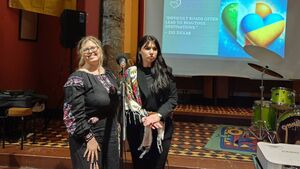Ukrainians in Mayo voice concerns over payment reductions

Maria Korsakova, left, is living in the McWilliam Park Hotel in Claremorris.
A leading organiser of the Ukrainian community in Ballyhaunis and Claremorris has described plans by the Government to reduce welfare payments as “concerning”.
Maria Koraskova, who lives in the McWilliam Park Hotel in Claremorris, highlighted the various difficulties in employment access for refugees based locally. She made her comments after the Government said it would put all Ukrainian refugees on €33.80 from August per week, a significant reduction on the €230 per week that many of them had been receiving.
“These are not gradual actions, this is a seven-fold reduction in weekly income,” said Ms Korsakova, who has assisted locally-based Ukrainians in organising cultural events and accessing services.
She explained how her search for work is a challenge given she’s a single parent. She purchased a second-hand car and insurance in order to be mobile and look for work in line with her career experience as a marketing executive.
“This is the only opportunity to be mobile and find work outside of your town. Because there are very few opportunities in Claremorris. Most of my compatriots work in the chicken factory in Ballyhaunis.”
Ms Korsakova wants clarity on how wages earned from employment will be linked to benefits and accommodation.
“For example, many offices are looking for cleaning employees who work from two to six hours per week. If a mother with a child under 14 years goes into such employment, will her 100% benefit be restored?
“According to the law, her income as a single parent up to €200 is not taxed and she has to gain full allowance. If the child is over 14 years old, the benefit is calculated proportionally for the days that the person worked.
“If we are talking about €38.80 per adult, in case of part-time work, will the entire benefit be restored or will it be proportionally deducted from €38.80?”
Ms Korsakova believes the Government’s placement of refugees has inhibited employment with older refugees placed in social housing in large cities and many youths placed in rural accommodation such as Ballinafad House, which “relatively speaking is in the middle of nowhere, where there is no public transport or work”.
A fluent English speaker with a successful career before the war forced her to leave the city of Chernihiv, Ms Korsakova wants to see more interaction between state employment agencies, and IPAS, the agency dealing with accommodation. She sees it as a waste of government training funds for well-qualified refugees to be expected to take cleaning jobs.
Access to food from the hotel is also an issue for workers.
“We have our last meal at 5pm and the kitchen does not leave lunchboxes for working residents. We have no kitchen, no refrigerator, no microwave... Ukrainians love to cook, so the restrictions in benefits specifically for hotel residents are just a kick in the back.”





